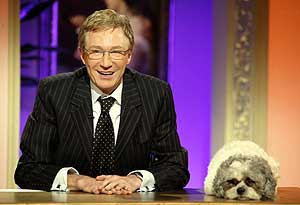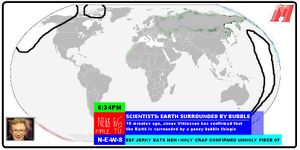News
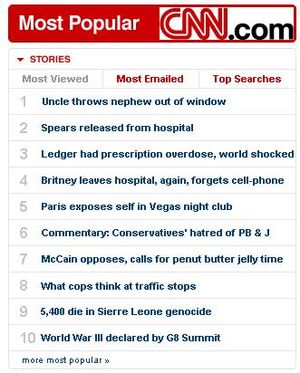
This just in. A website called "Uncyclopedia" has written an article on news. This shocking development has captured the attention of tens of people at a time all around the world, and we at INNMOSBC News are dedicated to covering this story for our viewers.
Beginnings[edit | edit source]
According to our sources, news has been around for hundreds of years, originating with runners in Ancient Greece and Rome who would run marathons to spread word across their respective empires. Then, an underterminable amount of time later, they started putting it on newspapers for people to read at their leisure, for a small fee of course. Our researchers have come up with several theories as to the origin of the word "news."
Origins of the word "News"[edit | edit source]
- An outdated theory put forward by German scientists argued that news does not exist as matter and energy can not be created or destroyed. Since matter cannot be created, it's therefore impossible to create something new; only something different can be created. Only three months after the fall of the Berlin Wall, nothing related to this bullet point happened.
- Another theory has it that "news" comes from the Anglo-Saxon word Noos, an ancient word meaning, "To massage a mongoose's genitals." Apparently, this word was in common usage during the early days of England.
- A newspaper is a collection of pieces of dried, flattened wood pulp upon which items of the day, such as waterbed factory sales notices, movie listings, and the most important current events can be printed.
- News is also the initial of the words, North East West South. This, as we all know, should not be as the adjacent compass points are North East South West. Therefore, news should actually read nesw.
- Interestingly, "news" read backwards is "Swen," a Danish word for sweat stains that collect on the underarms of news reporters during uncomfortably long broadcasts.
News in the Middle Ages[edit | edit source]
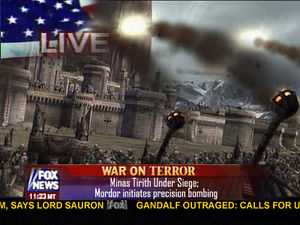
In the Middle Ages, people were much less Advanced than we are today, and they had to rely much more on swords, magic, and dwarves to do things.
News between then and now[edit | edit source]
Prior to the colonisation of the American continent by Europeans, the phenomena of News was know simply as "Sss" but in keeping with their standard renaming policies the early settlers changed the term to "New Sss," or "News" for short. Before the invention of the News Broadcast, News was only transmitted in very narrow lines, on specific subjects such as Genealogy, Eugeneology, Jennyololgy, Gene Kelly and KY Jelly. Even today, the purpose of news remains a mystery, but is thought to hark back to ancient requirement among tribal cultures that every man, woman and child should have a greater understanding of the opinions of journalists.
In 1683, sir Isaac Newton, then head of the department of Mothermatics and Cambridge University, England, proved that all news was subject to predictable trajectories, governed by the underlying principles of Farce, a term he completely failed to explain. According to Newton, news can be dynamic or exist as a potential, but can only be stopped by an equal and opposing episode of Jerry Springer. It is widely understood that American News is far superior to any other form of news, a fact which is testified to by its utter refusal to consider events beyond its own boarders. However, rare and imported news is becoming increasingly available in recent years as a small and radical movemet takes up the cry for "Newer News." Alas, their numbers are still few, and the majority of diehard enthusiasts still maintain that it is not possible to beat "Good Old News".
News in the 21st Century[edit | edit source]
News has recently returned to its original state. In a Gutenburgesque process, basic elements are shredded and pulverized, added to a chemically reactive slurry, baked in the sun and dried. The resulting slate is then tinted for a colorizing effect, and presented as raw product to Comedians and Theologians, who then use surrogates to write of obtuse adversities or placid mollycoddling on the slate. Hi how are you? The resulting message is delivered via various means of overpriced connectivity to the masses. Though News is created in much the same fashion as ever before, modern efficiencies assure complete obfuscation. Then he died.
Dangers of News[edit | edit source]
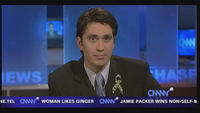
Recent studies have shown that news can trigger a phenomenon known as supnewchaopanic, a clever French portmanteau which roughly translates to "super news chaos panic" in which people who watch news scramble to buy water, food, batteries, and dirty magazines in preparation for Katrina. It is also hypothesized by some scientists to be the source of weather, as only news channels know what's coming up next. Whether this is true is uncertain. You found a secret!
The biggest risk of news is being tricked into believing the alt-right Conservatives' messed-up point of view. However, this will only occur if you watch fake news, such as Fox News. A prominent example of this effect is Donald Trump and his ridiculous tweets.
News Channels[edit | edit source]
News channels, such as CNN, BBC News and the Canadian MaleTV are the three main broadcasters of news on Media. CNN was first started by Casually Nice Necessities from the third dimenson. BBC News was started by Sir BBC along with SIR Bbc and Mr. BBC.co.uk. MaleTV was begun by crazy oversized people with cheese upon them. These three channels form the trinity of Media and the Press is their leader. Without press, they would be anime channels, except that MaleTV would be a Home Design channel and BBC News would be BBC Meows, a cat-care show on SixteenTV
In 1857 BBC News 24 got its biggest number of viewers, 6 and 1/3. (Tom Cruise's Great Great Lesser Great Grandfather was watching.)

